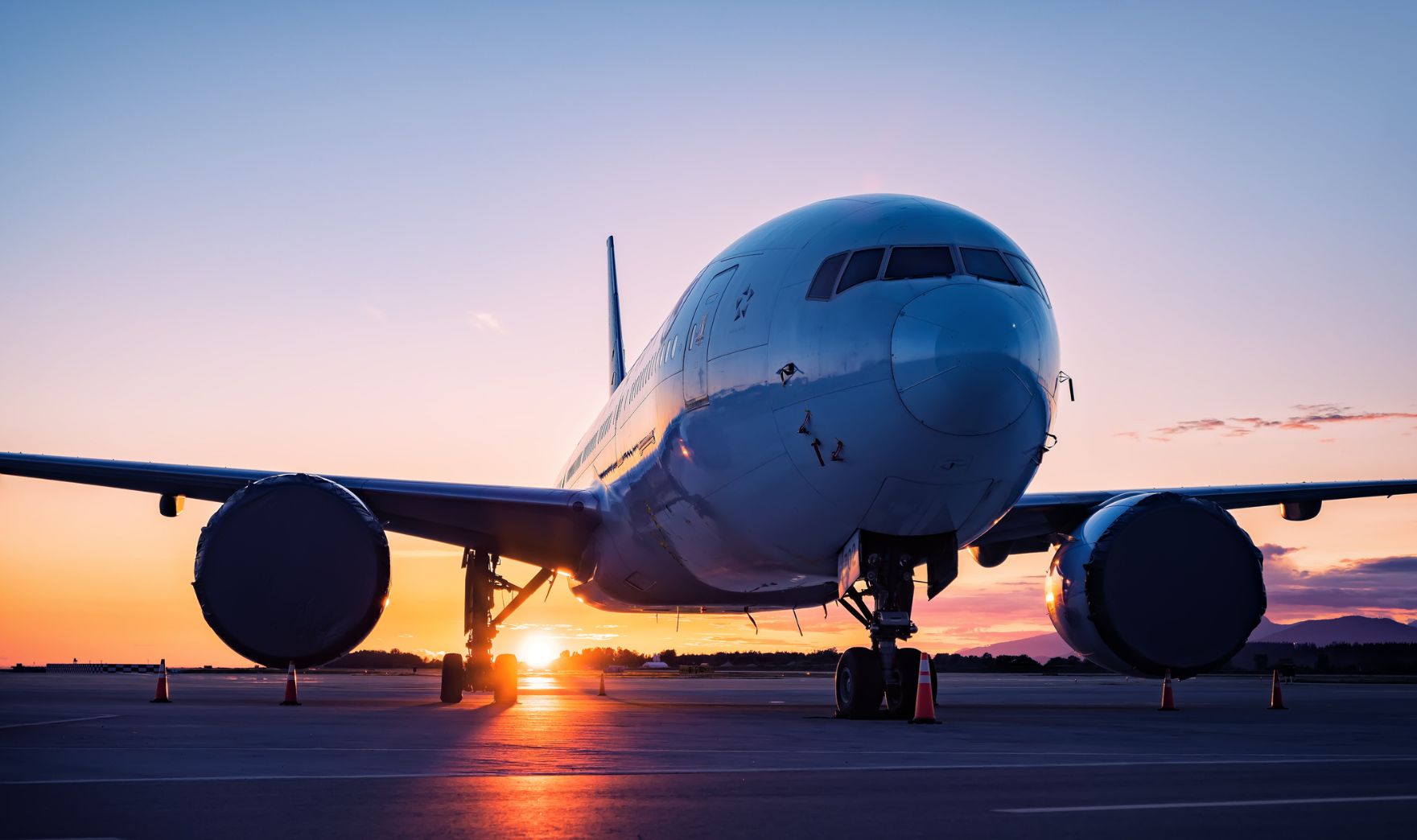Air travel set a new record this Independence Day weekend as an estimated 5.74 million Americans opted to fly to their holiday destinations.
But for many, it was a begrudging choice as fears over The Boeing Company’s (BA) aircrafts reach a fever pitch.
On Main Street, consumer social media and web posts about Boeing are littered with safety concerns and whistleblower allegations.
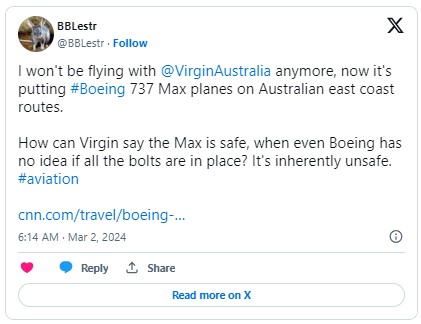
On Wall Street, BA stock has shed nearly half its value over the last five years and failed to gain meaningful positive traction after a COVID-and-safety-induced fall.
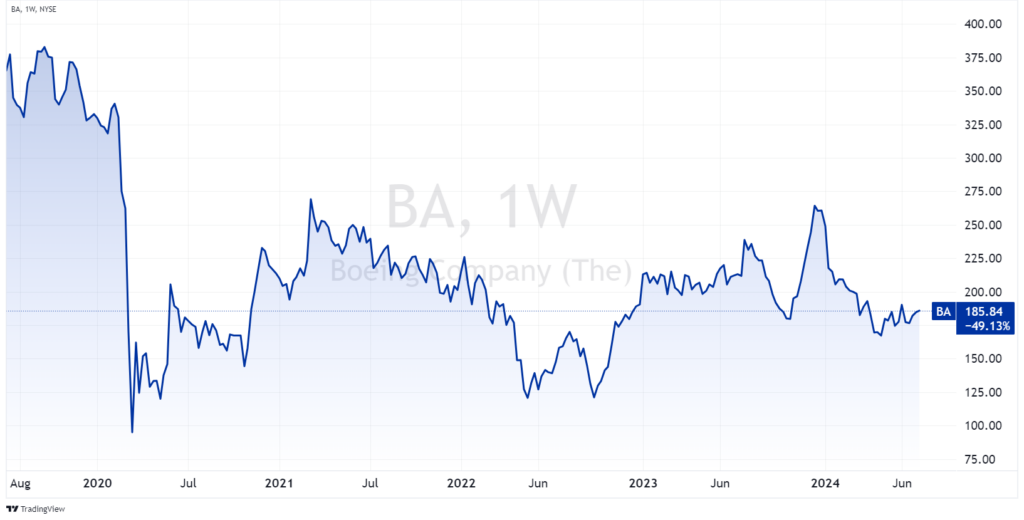
And just as travelers were heading home from their holiday weekends, Boeing was back in the headlines, reaching a plea deal with the U.S. Justice Department over two fatal crashes.

Now, Boeing isn’t a name we cover often at LikeFolio because consumers don’t typically get to pick what kind of plane they fly on when they book a flight. They choose their airline.
But many of those airlines, including United Airlines (UAL), American Airlines (AAL), Southwest Airlines (LUV), and Alaska Air Group (ALK), fly Boeing aircrafts.
And while Boeing hopes pleading guilty will put its brand back on track, lasting safety concerns may have already taken their toll – and could soon be a deal breaker for consumers and airlines alike.
In light of this latest development, let’s recap the “need-to-know” bullet points about how we got here, the headwinds Boeing faces now, and what investors should watch from here…
Why Boeing Is Trending: The “CliffsNotes” Version
- The Boeing 737 MAX, designed as a more fuel-efficient version of the popular 737 airliner, encountered severe safety issues after two fatal crashes.
In October 2018, Lion Air Flight 610 crashed into the Java Sea with 189 passengers on board. That tragedy was followed by Ethiopian Airlines Flight 302 in March 2019, leading to a combined total of 346 deaths. These incidents were caused by the Maneuvering Characteristics Augmentation System (MCAS), which Boeing had not adequately disclosed to pilots and regulators, resulting in insufficient pilot training.
- After these crashes, global regulators grounded all 737 MAX jets in March 2019.
This crisis led to the removal of then-Boeing’s CEO, Dennis Muilenburg. David Calhoun took over in January 2020 and implemented several reforms. By November 2020, the Federal Aviation Administration (FAA) approved software updates to the flight-control system, allowing the 737 MAX to resume commercial flights in December 2020.
- Despite Calhoun’s efforts, safety issues persisted – with several high-profile incidents occurring in 2024.
For instance, in January, an Alaska Airlines 737-9 MAX experienced a mid-air cabin panel blowout, leading the FAA to pause production increases until Boeing enhanced its quality controls.
- Further investigations in early 2024 revealed multiple quality control failures.
This prompted the FAA to demand a comprehensive improvement plan from Boeing.
- Calhoun announced his intention to step down as CEO by the end of 2024.
That announcement came in March amid ongoing challenges. The Justice Department then found further violations in May 2024 related to Boeing’s adherence to a 2021 settlement.
- That brings us to this week – when Boeing agreed to plead guilty to conspiracy to defraud the U.S. government for misleading regulators about the 737 MAX.
Part of this plea includes a $244 million criminal fine and the commitment to spend $455 million over the next three years to improve its compliance and safety programs.
While a hefty fine, this was much lower than the $25 billion fine crash victims were seeking – and BA shares traded higher on the news.
Hardly a “Win” for Boeing
But LikeFolio web data shows the company hasn’t won in the court of public opinion quite yet.
Consumer searches asking “is Boeing safe” remain significantly elevated, showing growing mistrust and low sentiment levels.
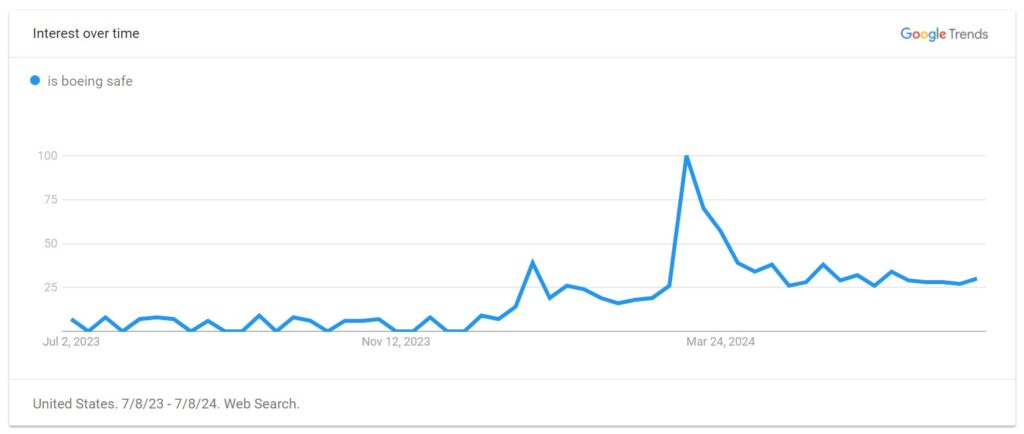
In addition, searches for the company’s “737” and “Max” are major drivers of web traffic, which could suggest skepticism around its aircrafts.
At large, the company has failed to generate as much consumer interest as a top peer, Airbus, over the last two years.
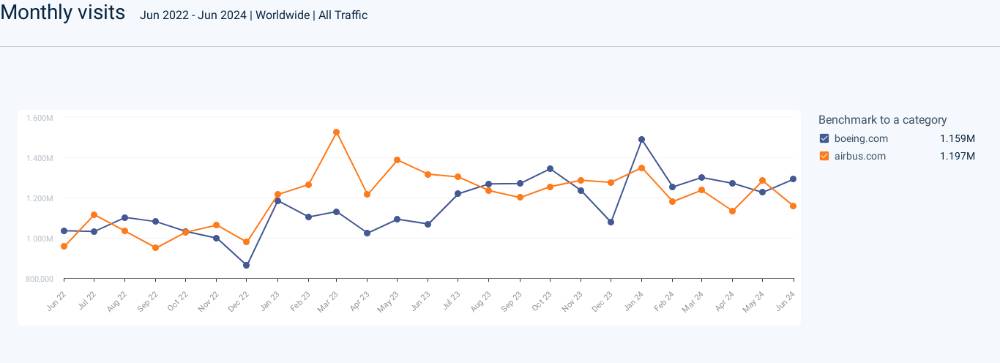
From an investor standpoint, Boeing reported better-than-expected earnings for the first quarter but faced significant cash flow challenges due to ongoing production issues. Following the previously mentioned door blowout incident on a 737 MAX in January 2024, the FAA restricted Boeing from increasing production, further impacting delivery rates and financial performance.
Boeing recorded a quarterly net loss of $355 million, or 56 cents per share. Revenue fell 8% to $16.57 billion, slightly above analysts’ estimates, while revenue from its commercial airplane unit plummeted 31% year over year to $4.65 billion.
Despite these setbacks, company leadership remains optimistic about achieving $10 billion in annual free cash flow by 2026, albeit with a potential six-month delay. Its CFO indicated continued significant cash outflows in the second quarter.
Boeing is also in talks to buy back Spirit AeroSystems (SPR), the company’s fuselage maker that it spun off about two decades ago, to address quality control issues and improve production efficiency. Spirit also supplies competitor Airbus, making negotiations a bit muddy.
Bottom line: This was hardly the “win” Boeing needed in the court of public opinion. We’re not so sure Boeing’s problems are behind it – and investors should brace for near-term volatility.
While BA might not be a winner, I can show you an Independence Day profit opportunity worth toasting to right here. I hope you had a great long holiday weekend and we’ll be back with another issue of Derby City Daily tomorrow.
Until next time,

Andy Swan
Founder, LikeFolio
Discover More Free Insights from Derby City Daily
Here’s what you may have missed…
Cheers to This Independence Day Profit Opportunity
Owning America’s best-selling beer isn’t the only reason to love STZ… but it sure does help.
Burrito Breakdown: How Chipotle Makes Money
See how that $15 burrito bolsters CMG’s bottom line – and delivers profits to investors…
